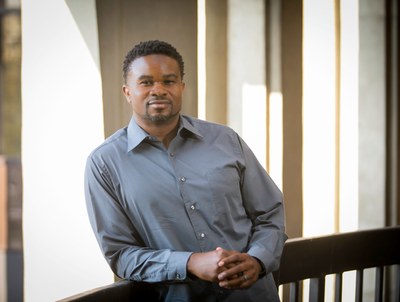SPHIS Home » News » Jelani Kerr's essay calls on bioethicists to take a stand against anti-Black racism
Jelani Kerr's essay calls on bioethicists to take a stand against anti-Black racism

Bioethicists’ unique skills and resources are necessary to remedy racial injustice and health inequities in the United States, writes University of Louisville School of Public Health and Information Sciences faculty member Jelani Kerr. He outlines these points in an essay included in a new report, “A Critical Moment in Bioethics: Reckoning with Anti-Black Racism Through Intergenerational Dialogue,” recently published by The Hastings Center.
As an academic field concerned with health and health care issues – particularly the influence of structures, policies, practices and norms on conditions that unfairly advantage some and disadvantage others throughout society – bioethics has a moral responsibility to respond to the longstanding harms that racism has posed to the overall health and well-being of Black, Indigenous, Latinx and other people of color. Yet, over its 50-year history, bioethics as a field has remained largely silent on issues of racial injustice.
In his essay, “Now You Are Part of the Solution: Bioethicists' Contribution in Addressing Racialized Health Inequity,” Kerr says bioethicists can play a key role in addressing health disparities that disproportionately affect Black Americans.
“Given the social and cultural capital bioethicists have in the fields of medicine, public health and policy, this group is uniquely positioned to help remediate racial and ethnic inequity,” he wrote. “Moreover, the unique skill sets bioethicists employ – conflict resolution, mediation, negotiation, facilitating public engagement, policy analysis – can be useful to improving the health of the populous.
“Thus, bioethicists can play a key role in addressing the most concerning health challenges and inequities today.”
The special report represents a collaboration between an independent antiracism task force of bioethicists from across the United States and The Hastings Center, as part of the Center’s health equity initiative. Highlighting the intergenerational work of mostly Black scholars, the report examines structural racism—particularly anti-Black racism— in health care settings, in health equity research and practice, and in bioethics.
“[I]n this critical moment in United States history, we reckon with anti-Black racism and the lack of prioritization of social and racial justice in the field [of bioethics] by gathering behind social justice issues specifically affecting the health and well-being of Black people,” the editors state in the introduction.
The report includes articles, essays and commentaries and presents considerations for transforming bioethics scholarship and education, health care and medical education and health equity research to address structural and systemic forces that perpetuate social injustice.
“This special report is a call for structural change, a much-needed push to move from silent allies and activists within our trades, our professional organizations, our communities of practice, our communities of living and our discipline communities —to uphold and uplift the values of justice and respect for persons within each of our communities and work toward being antiracists,” wrote task force member Vanessa Y. Hiratsuka.
The editors of the special report are Faith E. Fletcher, Center for Medical Ethics and Health Policy, Baylor College of Medicine; Keisha S. Ray, McGovern Center for Humanities and Ethics at the University of Texas Health Science Center at Houston; Virginia A. Brown, Department of Population Health, Dell Medical School, University of Texas at Austin; and Patrick T. Smith, Trent Center for Bioethics, Humanities & History of Medicine, Duke University.
The report was supported by a grant from The Greenwall Foundation.
The Hastings Center located in Garrison, New York, is a nonpartisan research institution dedicated to bioethics and the public interest. Founded in 1969, the center is a pioneer in collaborative interdisciplinary research and dialogue on the ethical and social impact of advances in health care and the life sciences. The center draws on a worldwide network of experts to frame and examine issues that inform professional practice, public conversation and social policy.






